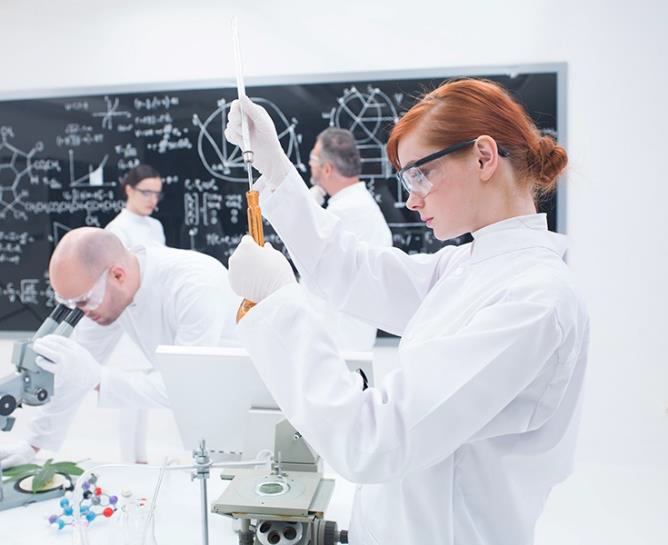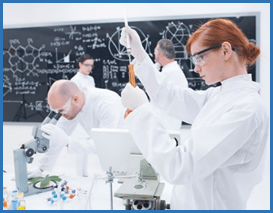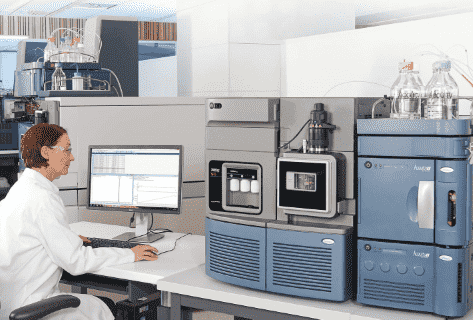COURSE OVERVIEW
LE0560 : Advanced Statistical Analysis of Laboratory Data

OVERVIEW
| COURSE TITLE | : | LE0560 : Advanced Statistical Analysis of Laboratory Data |
| COURSE DATE | : | Oct 21 - Oct 25 2024 |
| DURATION | : | 5 Days |
| INSTRUCTOR | : | Dr. Yousef Al-Mashni |
| VENUE | : | Abu Dhabi, UAE |
| COURSE FEE | : | $ 5500 |
| Request For Course | ||
OTHER SCHEDULED DATES
Course Description
The analytical laboratory has always served an important function by providing data in support of other branches of science and engineering and in helping control product quality or process variables. In recent years, however, the laboratory has in many cases come into its own as a semi-independent entity, geared to the solution of problems by means of the techniques available to it, rather than serving only to provide data for others to interpret.
Whether these problems are solved independently or by co-operative effort is not important. What is important is that the broad capabilities of the laboratory be recognized. Where this is the case, the laboratory can exercise a unique function in developing information essential to the organization of which it is a part, and its staff will enjoy the prestige among its peers that it merits.
Generally, the function of the industrial analytical laboratory is designated as process or product quality control, technical service, or research and development. Often, however, two or more of these functions are exercised in the same laboratory, sometimes by the designation of personnel for a specific type of assignment. It should be emphasized that through the majority of analytical laboratories may be those serving industry and can be placed in one of these four categories, many operations and problems are similar, regardless of the laboratory’s affiliation, and can be viewed from the same perspective.
The purpose of any analytical measurement is to get consistent, reliable and accurate data. There is no doubt that incorrect measurement results can lead to tremendous costs. In addition, reporting incorrect analytical results at any particular time leads to loss of a laboratory’s confidence in the validity of future results. Therefore, any laboratory should do its outmost to ensure measuring and reporting reliable and accurate data within a known level of confidence. Validation and qualification of processes and equipment will help meet this goal.
The appraisal of quality has a considerable impact on analytical laboratories. Laboratories have to manage the quality of their services and to convince clients that the advocated level of quality is attained and maintained. Increasingly, accreditation is demanded or used as evidence of reliability. Quality control is not meaningful unless the methodology used has been validated properly. Validation of a methodology means the proof of suitability of this methodology to provide useful analytical data. A method is validated when the performance characteristics of the method are adequate and when it has been established that the measurement is under statistical control and produces accurate results.
Despite the fact that a laboratory may have met all qualification and accreditation requirements, its reported data are still subject to verification and challenge. The quality of chemical analysis is usually evaluated on the basis of its uncertainty compared to the requirements of the users of the analysis. If the analytical results are consistent and have small uncertainty compared to the requirements, the analytical data are considered to be of adequate quality. When the results are excessively variable or the uncertainty is larger than the needs, the analytical results are of low or inadequate quality. Thus, the evaluation of the quality of analysis results is a relative determination. What is high quality for one sample could be unacceptable for another. A quantitative measurement is always an estimate of the real value of the measure and involves some level of uncertainty. The limits of the uncertainty must be known within a stated probability, otherwise no use can be made of the measurement. Measurement must be done in such a way that could provide this statistical predictability.
Statistics is an integral part of quality assessment of analytical results. The concept of a frequency distribution, which embodies the behaviour of change fluctuations, is a felicitous one for the description of many pertinent aspects of measurement. If this concept is combined with the principle of least squares, by which the inconsistencies of measurements are compensated, and with the modern ideas underlying “inverse probability,” which allow us to make quantitative statements about the causes of observed chance events, we obtain an impressive body of useful knowledge.
Nevertheless, it is by no means certain that a systematic science of data analysis, if and when it finally be developed, will be based exclusively on probabilistic concepts. Undoubtedly probability will always play an important role in data analysis but it is rather likely that principles of a different nature will also be invoked in the final formation of such a science. In the meantime, we must make use of whatever methods are available to us for a meaningful approach to the analysis of experimental data.
This course is designed to provide participants with good knowledge and skills required to perform advanced statistical calculations in modern analytical laboratories. The course starts by reviewing the existing knowledge of participants on the fundamental concepts of statistics. Method development and validation will then be discussed which also include the quality requirements as per the ISO 17025 standard. Participants will then be introduced to the process of measuring uncertainty estimation by identifying uncertainty sources, quantifying and reporting combined uncertainty. The course will then discuss the various calibration functions and the types of statistical quality control charts (SQC) and wrap up with the procedures and methods used to interpret the inter & intra laboratory data. Participants will have the opportunity to apply the principles learned to actual problems through the use of illustrative case studies under the guidance of the instructor. Through a combination of lectures and problem-solving sessions, participants will learn advanced statistical techniques that they can put to immediate use in their laboratory.
Whether these problems are solved independently or by co-operative effort is not important. What is important is that the broad capabilities of the laboratory be recognized. Where this is the case, the laboratory can exercise a unique function in developing information essential to the organization of which it is a part, and its staff will enjoy the prestige among its peers that it merits.
Generally, the function of the industrial analytical laboratory is designated as process or product quality control, technical service, or research and development. Often, however, two or more of these functions are exercised in the same laboratory, sometimes by the designation of personnel for a specific type of assignment. It should be emphasized that through the majority of analytical laboratories may be those serving industry and can be placed in one of these four categories, many operations and problems are similar, regardless of the laboratory’s affiliation, and can be viewed from the same perspective.
The purpose of any analytical measurement is to get consistent, reliable and accurate data. There is no doubt that incorrect measurement results can lead to tremendous costs. In addition, reporting incorrect analytical results at any particular time leads to loss of a laboratory’s confidence in the validity of future results. Therefore, any laboratory should do its outmost to ensure measuring and reporting reliable and accurate data within a known level of confidence. Validation and qualification of processes and equipment will help meet this goal.
The appraisal of quality has a considerable impact on analytical laboratories. Laboratories have to manage the quality of their services and to convince clients that the advocated level of quality is attained and maintained. Increasingly, accreditation is demanded or used as evidence of reliability. Quality control is not meaningful unless the methodology used has been validated properly. Validation of a methodology means the proof of suitability of this methodology to provide useful analytical data. A method is validated when the performance characteristics of the method are adequate and when it has been established that the measurement is under statistical control and produces accurate results.
Despite the fact that a laboratory may have met all qualification and accreditation requirements, its reported data are still subject to verification and challenge. The quality of chemical analysis is usually evaluated on the basis of its uncertainty compared to the requirements of the users of the analysis. If the analytical results are consistent and have small uncertainty compared to the requirements, the analytical data are considered to be of adequate quality. When the results are excessively variable or the uncertainty is larger than the needs, the analytical results are of low or inadequate quality. Thus, the evaluation of the quality of analysis results is a relative determination. What is high quality for one sample could be unacceptable for another. A quantitative measurement is always an estimate of the real value of the measure and involves some level of uncertainty. The limits of the uncertainty must be known within a stated probability, otherwise no use can be made of the measurement. Measurement must be done in such a way that could provide this statistical predictability.
Statistics is an integral part of quality assessment of analytical results. The concept of a frequency distribution, which embodies the behaviour of change fluctuations, is a felicitous one for the description of many pertinent aspects of measurement. If this concept is combined with the principle of least squares, by which the inconsistencies of measurements are compensated, and with the modern ideas underlying “inverse probability,” which allow us to make quantitative statements about the causes of observed chance events, we obtain an impressive body of useful knowledge.
Nevertheless, it is by no means certain that a systematic science of data analysis, if and when it finally be developed, will be based exclusively on probabilistic concepts. Undoubtedly probability will always play an important role in data analysis but it is rather likely that principles of a different nature will also be invoked in the final formation of such a science. In the meantime, we must make use of whatever methods are available to us for a meaningful approach to the analysis of experimental data.
This course is designed to provide participants with good knowledge and skills required to perform advanced statistical calculations in modern analytical laboratories. The course starts by reviewing the existing knowledge of participants on the fundamental concepts of statistics. Method development and validation will then be discussed which also include the quality requirements as per the ISO 17025 standard. Participants will then be introduced to the process of measuring uncertainty estimation by identifying uncertainty sources, quantifying and reporting combined uncertainty. The course will then discuss the various calibration functions and the types of statistical quality control charts (SQC) and wrap up with the procedures and methods used to interpret the inter & intra laboratory data. Participants will have the opportunity to apply the principles learned to actual problems through the use of illustrative case studies under the guidance of the instructor. Through a combination of lectures and problem-solving sessions, participants will learn advanced statistical techniques that they can put to immediate use in their laboratory.
TRAINING METHODOLOGY
This interactive training course includes the following training methodologies:
LecturesWorkshops & Work Presentations
Case Studies & Practical Exercises
Videos, Software & Simulators
In an unlikely event, the course instructor may modify the above training methodology for technical reasons.
VIRTUAL TRAINING (IF APPLICABLE)
If this course is delivered online as a Virtual Training, the following limitations will be applicable:
| Certificates | : | Only soft copy certificates will be issued |
| Training Materials | : | Only soft copy materials will be issued |
| Training Methodology | : | 80% theory, 20% practical |
| Training Program | : | 4 hours per day, from 09:30 to 13:30 |
RELATED COURSES

LE0290 : Advanced GLP: Uncertainty Measurement, Data Validation, Method Validation & Statistical Process Control (SPC) in Analytical Laboratory According to ISO 17025
- Date: Jan 19 - Jan 23 / 3 Days
- Location: Al Khobar, KSA
- Course Details Register

LE0160 : Gas Chromatography Operation, Application, Troubleshooting & Method Validation
- Date: Jan 19 - Jan 23 / 3 Days
- Location: Dubai, UAE
- Course Details Register
